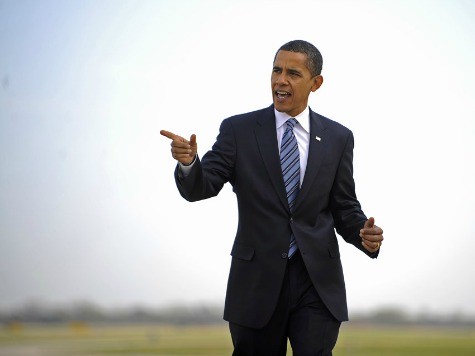
President Barack Obama’s speech at Knox College in Galesburg, Illinois was billed as an address on the economy, the first of a series of economic orations. Yet instead of presenting a policy agenda, Obama launched a partisan attack reminiscent of his most blistering addresses of the 2012 presidential campaign, dismissing concerns about “phony scandals” and attacking Republicans for promoting “gridlock” in Washington.
As predicted, Obama claimed credit for increases in private sector job growth. Yet he also focused on “the one percent,” attacking the growth of economic inequality in American society, calling for a renewed emphasis on shared prosperity. He hearkened back to his 2005 address in Galesburg, which praised Franklin Delano Roosevelt, but Wednesday’s speech was more reminiscent of his leftist rhetoric in Osawatomie in 2011.
As he did on the campaign trail, Obama highlighted the “middle class,” telling an audience of cheering students that he would resist those forces that had “conspired” to keep the middle class from advancing. Obama also slammed Republicans for imposing spending cuts and supporting the budget sequester–even as he took credit for what he called the fastest reductions in the deficit in sixty years, which only the sequester made possible.
Obama also promised “to use the power of my office” to address the cost of higher education and to enact other policies that would address middle-class needs. While acknowledging that some Republicans in the Senate had come forward to help him move his agenda forward, he noted many in the House had not, and he promised to go around Congress when he felt it necessary to avoid what he described as GOP obstruction.
Describing the pillars of the middle class–home ownership, education, health care, and others–Obama defended his signature health care legislation, describing Republican criticism of the Obamacare as mere politics. “There are folks out there who are actively working to make this fail,” Obama warned, accusing his opponents of a “politically motivated misinformation campaign” and of wanting to hurt the uninsured.
The president also touted expansions in energy production, though he did not mention any plans to approve the Keystone XL pipeline or to re-open oil and gas exploration and development on the continental shelf. And he ticked off key issues that have dominated his second-term agenda thus far–immigration reform, climate change, and withdrawal from Afghanistan–connecting each to his vision for the nation’s economy.
Obama did include some free-market caveats. “Here in America, we’ve never guaranteed success. That’s not what we do,” he said, to a smattering of applause. But “that idea’s always been combined with a commitment to equality of opportunity,” Obama said. “Unfortunately, opportunities for upward mobility in America have gotten harder to find over the past thirty years. And that’s a betrayal of the American idea,” he said.
Therefore, Obama said, there needed to be a “new push” to help those not yet in the middle class enter it. To that end, he said, the U.S. needed to raise the minimum wage, among other interventions, as well as “calling on the private sector to step up.” Obama concluded by promising “an economy that grows from the middle out, not the top down. That’s where I’ll focus my energies…for the remainder of my presidency.”
“We’re going to need Republicans in Congress to set aside short-term conflicts and work with me to find common ground,” he said, claiming that there were members of the opposition who agreed with him privately but would not cooperate with him for fear of political retaliation. Others were “playing to the most strident supporters” or had a “fundamentally different vision” that said inequality was “inevitable and just.”
Obama warned Congress: “I’m laying out my ideas to give the middle class a better shot. So now it’s time to lay out your ideas. You can’t just be against something; you’ve got to be for something,” Obama said, stifling a laugh, wandering off script. “Repealing Obamacare and cutting spending is not an economic plan. It’s not.” It was as if we were back in December 2011, waiting for another campaign to begin, a politics without end.

COMMENTS
Please let us know if you're having issues with commenting.